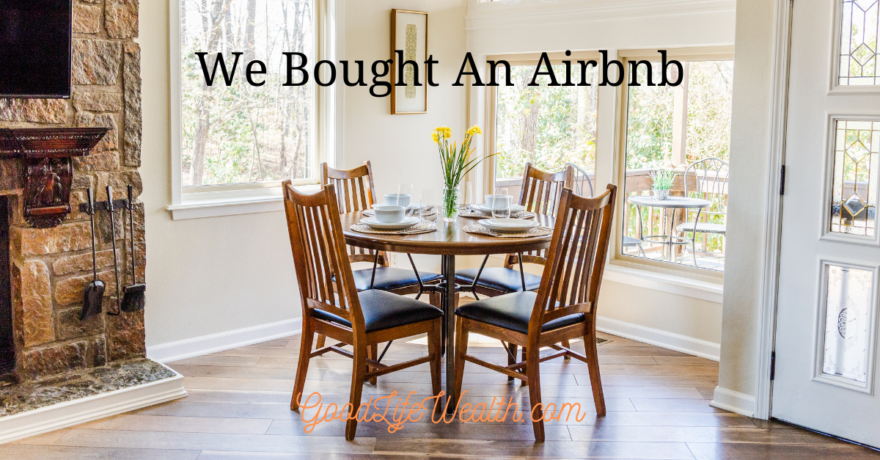In January, we bought a house in Hot Springs, Arkansas and have listed it on Airbnb. This is a new venture for us and I wanted to share my evolving thoughts about debt, inflation, cash, and real estate. Although the stock market has been down so far in 2022, don’t think that this means I am giving up on stocks as an investment. Not at all!
If you want to check out our property, here is the listing on Airbnb. My wife, Luiza, has done a great job of decorating and furnishing the house. And I owe a big thank you to my parents who spent three weeks helping us with renovations. It has been live for one week now, and we have eight bookings in April and May. Let me know what you think about the listing!
We Went Into Debt
Prior to this purchase, we were debt free and we purchased our new property with a mortgage. I could have sold investments and paid cash for the house, but I think that would have been a bad idea. Taking a mortgage is the better choice.
Leverage can be a tremendous tool, when used properly. Taking on debt to buy appreciating assets and cash flowing investments can have a multiplier effect. This is “good” debt. Bad debt would be spending on depreciating assets like cars, or using credit card debt to fund a lifestyle. I eventually realized that being debt-free would actually slow down our growth versus taking on some smart debt.
For Airbnb investors, a property evaluation is often based on the “Cash on Cash” return. What does that mean? Let’s consider a $200,000 house which produces a hypothetical $14,000 a year in profit. If you purchase the property with $200,000 cash, your Cash on Cash return is 7%. But if you put only 20% down ($40,000) and make $8,000 (net of the monthly mortgage), your cash on cash return is 20%. In other words, it can be a fairly attractive investment because of the leverage. Without the debt, the returns are not that compelling compared to stocks, for example. And if you use mortgages, you can buy $1 million of properties with $200,000 down. That could grow your wealth much faster than just buying one property for $200,000.
Debt, Inflation, and Government Spending
Beyond the numbers for this particular house, I think the world is now favoring debtors. Our government spending has been growing for years. And then when the pandemic hit, spending shot up dramatically and shows little sign of returning to its previous trajectory.
Our government, and many others, are running massive deficits and have no intention or ability to reduce spending. They will simply never pay off this debt. It will only grow. (See: the US Debt Clock.) We now have inflation of over 7%. I don’t think inflation will stay this high, but I also don’t think it will go back to 2%. Governments will have to inflate their way out of debt. There is an excellent video from billionaire hedge fund manager Ray Dalio: the Changing World Order. He documents historical civilizations who expanded debt and saw resultant inflation. It is a brilliant piece if you want to understand today’s economy.
Inflation favors debtors and penalizes holders of cash and bonds. 7 percent inflation over 5 years will reduce the purchasing power of $1000 to $600. The holder of a bond will see a 40% depreciation of the real value of their bond. And the debtor, such as the US government or a mortgage holder, will benefit on the other side.
I reached the conclusion that I should be a debtor like our government. Staying in cash and a lot of bonds, would be a poor choice long term. I didn’t sell any stocks to buy our investment property, but I did reduce cash and bonds. Today, we can borrow at 3-5% while inflation is at 7%. And if interest rates do come back down to 2%, I can always refinance the mortgage.
Read more: Inflation Investments
Thoughts on Real Estate Investing
- Real Estate is a business, not a passive investment. Managing an Airbnb is time consuming and can have headaches of dealing with people and problems. We have spent a huge amount of time (and about $14,000) improving our property and furnishing it for Airbnb. Buying an Index Fund does not carry as much risk or time commitment!
- It is the leverage which makes real estate attractive. Without the mortgage, not so much. (Imagine if we could buy $100,000 of an S&P 500 Index fund with only 20% down. That would be incredible over the long term.)
- Higher inflation can help real estate prices and rent prices, while our mortgage stays fixed. Besides the cash flow, we also benefit from: 1. Paying down the mortgage and building equity. 2. Increasing home value over time. 3. Some tax benefits such as depreciation.
- Your personal residence is still an expense, not an investment. More pre-retirees should be looking into House Hacking. This will enable many to retire years earlier.
- I like the returns on short-term rentals. With elevated prices today, many long term rentals have mediocre cash flow potential. Especially if we have some repair expenses and vacancy.
So far, we are happy to have bought an Airbnb. It fits well with our willingness to take risks, start a business, and do repairs ourselves. We are looking to buy another. But we know it’s not for everyone. If this is something which interests you, I am happy to discuss it with you and share what I know.







